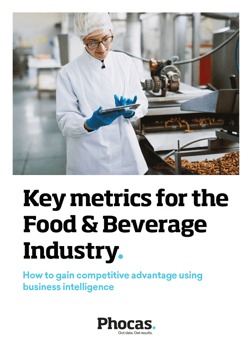Five reasons food and beverage companies love business intelligence

Many food and beverage companies love business intelligence. In this blog, we discuss five reasons why.
Benefit 1: Sales
BI allows your sales team to analyze customer buying patterns and market conditions to quickly detect emerging sales trends. With BI, your team can create detailed customer profiles which identify customer preferences, purchasing patterns, reactions to promotions, and more. With these insights, your team can leverage this data to make sales forecasts, identify customers in decline, take action to retain those valuable customers, and take advantage of newly discovered sales opportunities. Having a clear picture of sales trends and opportunities allows more collaboration in marketing and management strategies.
Benefit 2: Marketing
By monitoring sales trends, your company can refine its strategic marketing decisions. With BI, your marketing team is able to quickly identify your returns on promotional campaigns and analyze outcomes. By monitoring customer responses, your team can customize your promotions and prioritize campaign efforts. Through refining your marketing strategies, your marketing department is now accountable for optimizing strategies to produce the best ROI.
Benefit 3: Finance
Having a real-time view of your company’s financial picture enables your managers to get instant answers to income opportunities and cost concerns. Your executives and managers can view detailed information on your general ledger, profit and loss statement, and balance sheets. BI allows them to examine incoming and outgoing finances of the present and the past, break down revenue by location, and even drill down to individual transactions. This level of visibility enables executives to make fact-based decisions from an accurate picture of your company’s financial status. The ability to customize your dashboard enables you to track your key performance indicators for more effective financial oversight, and the data holds your leaders accountable for their decisions and future results.
Benefit 4: Purchasing and inventory management
With better visibility, your purchasing department can drastically improve the efficiency of stock handling and reduce the loss of perishable stock. By identifying problem areas, you can make informed decisions on how much to order, when and at what price, enabling your managers to adjust pricing tiers to increase profit margins.
By isolating poor purchasing decisions, you can ensure your raw materials won’t become a wasted investment in dead stock. With BI your managers are able to monitor slow moving stock, inventory-to-purchase ratios, and stock turns, thereby refining your inventory management in the process. The result is a reduction in excess inventory and the costs to maintain it.
Benefit 5: Executives and Managers
BI dashboards provide your executives and managers with a comprehensive, holistic, and factual overview of your entire company. Armed with these facts, your executives can use the data to guide crucial decision making. Your executives are also able to get a clear picture of each department’s productivity within the company. This insight enables your executives to set key performance indicators (KPIs) that align with your goals.
“We are now able to make decisions based on fact rather than intuition. We can drill down through the information to whatever we want and cross reference sales to customer, stock or sales rep. This is very valuable in terms of identifying opportunities or missed sales,” said Phocas customer Doug Mateljan, Managing Director for Craven Foods,
After implementing BI, companies experience a new level of effectiveness in each area of their business. This translates to improved sales and profit margins, increased production efficiency, enhanced financial planning, and effective marketing strategies. With such overarching benefits, this is why food and beverage companies love BI.
To learn the key metrics to measure in the food and beverage industry, download your free eBook below.

Empowering businesses with intuitive data analytics, driving informed decisions for growth and profitability. We make people feel good about data.

The food and beverage industry key metrics
From the apple orchard to the check-out, business intelligence (BI) uncovers opportunities and risks hidden in your product lifecycle and company performance.
Read more
How can wholesale food businesses increase sales?
The wholesale food industry is faced with many new challenges as a result of the pandemic, most notably a decline in demand for goods as hotels, restaurants, schools and sporting venues operate at a lower capacity. As countries continue to battle the virus, consumer spending on food has not returned to prior-year levels as restaurants open, then close and partially open again. Some distributors have evolved their business models to supply retail grocers and many have turned to their data to examine every product line and determine whether it's profitable.
Read more
Why data analytics in industry matters
Having the right data analytics tool is essential for making smart business decisions. But generic solutions don’t always fit a company’s unique needs. With cloud technology, industry-specific analytics tools—also known as vertical software-as-a service (SaaS)—are becoming increasingly popular. These tailored solutions help businesses in specific industries get better insights, optimize operations and increase their competitive advantage.
Read more
How to increase margins in your food distribution company
The changing demand for organic, fair-trade or locally sourced products, as well as changing food industry regulations, are putting a strain on food and beverage distribution companies. Coupled with the perishable nature of many products and the power of major grocery chains, increasing margins can be a challenge. Data analytics is proving to be a powerful way for food and beverage companies to predict changes in demand and respond accordingly.
Read more
Find out how our platform gives you the visibility you need to get more done.
Get your demo today